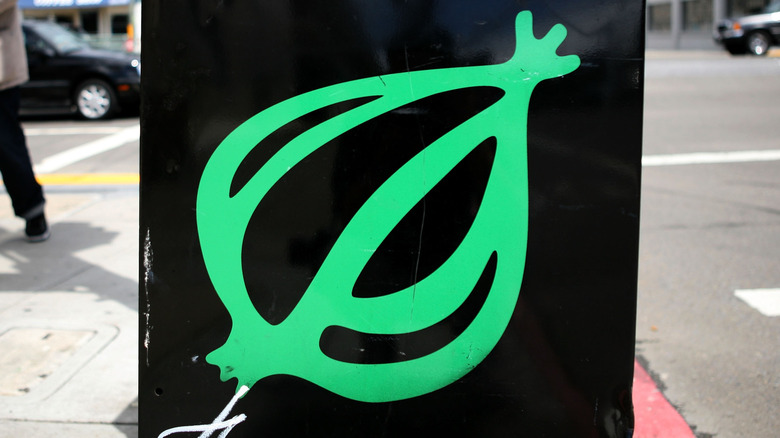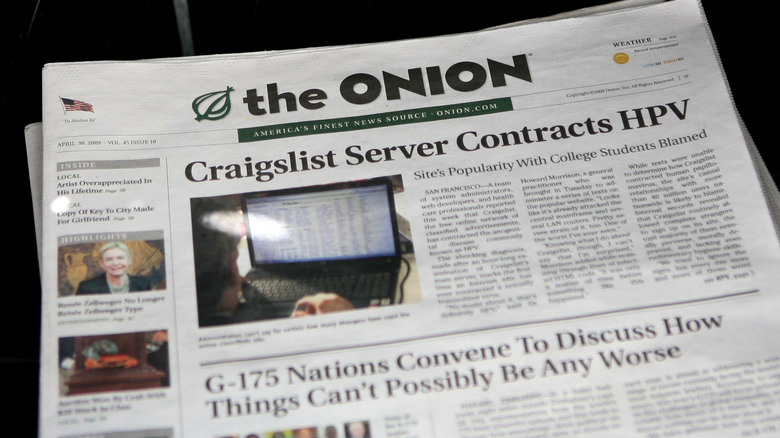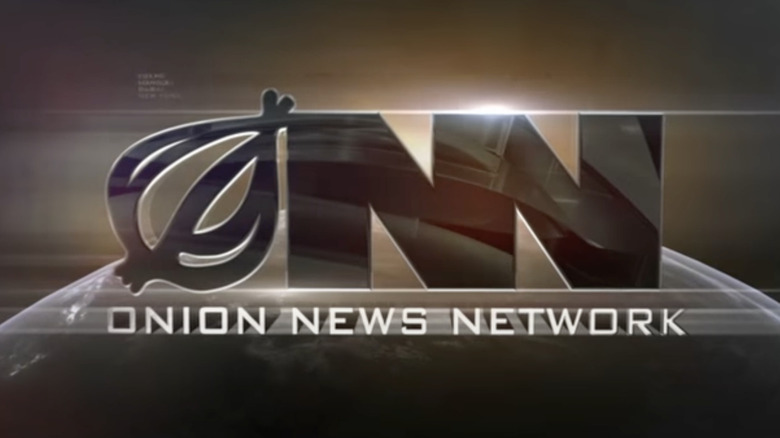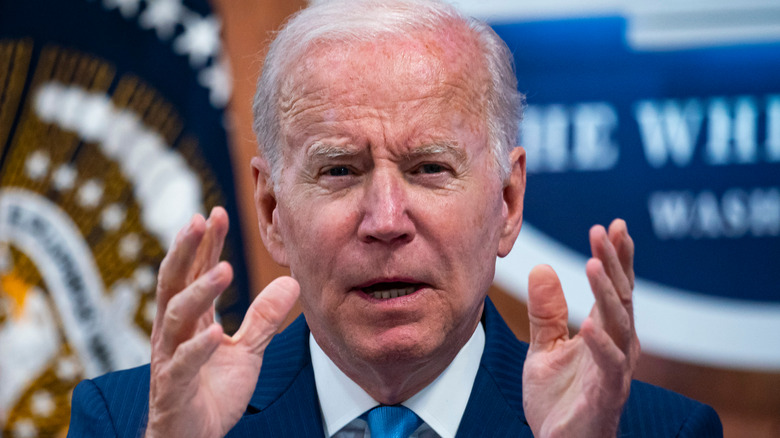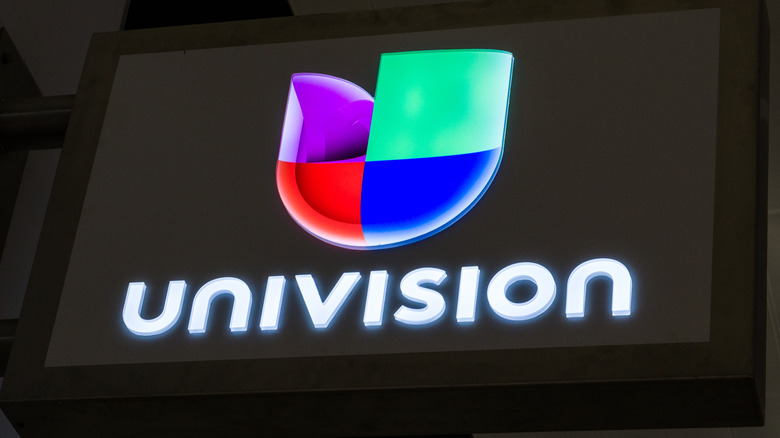The Untold Truth Of The Onion
Long before "fake news" became a dismissive epithet lobbed at unflattering media coverage, The Onion established an entirely different and highly potent form of imaginary information. Starting out as a small college publication in Wisconsin in the 1980s, The Onion evolved into one of the internet's definitive humor sites and comic authorities in the 1990s and beyond, delivering taut, caustic, and wildly funny pieces of satire and commentary in the form of mock-traditional, dryly reported newspaper stories, editorials, briefs, and cartoons. Like "Weekend Update" from "Saturday Night Live" before it and "The Daily Show" after it, The Onion has sent up world leaders and events whenever they're newsworthy, while also making up grand stories out of humdrum events — all in a much-emulated, difficult-to-replicate style.
The Onion's staff of comedy writers has churned out countless viral and thought-provoking pieces, all using humor to enlighten and enrage, making it the center of a media and entertainment empire. So, let's peel back the outer layers and look into the heart of The Onion.
It started at a college as an ad circular
Cheekily calling itself "America's Finest News Source," The Onion didn't begin as a fake-news icon, nor did it even have the intentions to become that. In 1988, according to the Washington Post, two University of Wisconsin-Madison students, Tim Keck and Christopher Johnson, founded The Onion. According to latter-day editor-in-chief Robert Siegel (via the Madison Capital Times), the paper was a simple sheet of highly distributable ads for pizza parlors and other local businesses, the silly and obviously phony news stories meant to catch attention and fill up empty space. (The first issue featured the headline "Mendota Monster Mauls Madison.") About a year after creating the paper, Keck and Johnson sold the business to colleagues: Onion publisher Peter Haise and Onion cartoonist Scott Dikkers bought it for $16,000. Keck and Johnson both went on to run successful alt-weekly newspapers while Haise and cartoonist Dikkers expanded the publication and solidified its voice and tone.
The personnel switched over early, but the name didn't. According to Onion then-president Sean Mills in a 2007 interview with Wikinews, it was Keck who'd christened the paper The Onion. "He said it was literally that his uncle said he should call it The Onion when he saw him and Christ Johnson eating an onion sandwich. They had literally just cut up the onion and put it on bread." That makeshift meal was all the cash-strapped paper and its editors could afford to eat in 1988.
Janet Jackson nearly squashed The Onion
For nearly the first decade of its existence, The Onion was purely a print-only publication, according to Slate, available by mail-order subscription for free in newspaper boxes in and around the University of Wisconsin-Madison since its launch in 1988. A combination of a hyper-local paper and a college humor magazine, The Onion wasn't very well known outside of Madison, but that all changed in 1996. That's the year The Onion embraced the burgeoning internet and put its full, weekly issue online — and for free, just like the print version.
However, all that exposure made The Onion more visible — and accountable. Around the same time as its internet launch, The Onion entertained a legal threat from Janet Jackson after it ran an article titled "Dying Boy Gets Wish: To P**k Janet Jackson." "We were very nearly sued out of existence," former Onion editor-in-chief Robert Siegel told the Madison Capital Times.
But The Onion survived and was internationally famous by 2010 — at which point it had more than 10 million unique monthly visitors, per The Guardian – and expanded its free print distribution to eight cities, such as Austin, Chicago, and Denver. That business model proved unsustainable, and in 2013, according to USA Today, The Onion permanently folded its physical version.
The Onion has fooled a lot of people a lot of times
The Onion looks so much like a real newspaper or newspaper's website and reports about so many actual events and real people when they're newsworthy — and in such a straight-faced, journalistically adherent manner that the comedic, satiric, pretend-news outlet has inadvertently tricked many prominent individuals and organizations not in on the joke into believing that its stories are real and truthful.
In 2010, Fox Nation (according to Mediate) shared the Onion story "Frustrated Obama Sends Nation Rambling 75,000-Word E-mail" with no indication that they knew or wanted their readers to know the story was a joke. Two years later, Chinese outlet The People's Daily Online spread the story that People magazine had named North Korean leader Kim Jong-un its "Sexiest Man Alive," a not-true report first published in The Onion (per The Guardian). In 2015, per the CBC, ex-FIFA president Jack Warner, ousted after corruption charges, released a video complaining about a rush-staged World Cup in the United States, which he apparently learned from a news report he held titled "FIFA Frantically Announces 2015 Summer World Cup in United States" — an Onion piece.
In one 1998 issue, The Onion announced, "Chinese Woman Gives Birth To Septuplets: Has One Week To Choose," stating that six children would be killed, in adherence to China's ban on multi-child families. According to Wired, the story went viral and inspired prayer vigils around the U.S.
The Onion captured a mood with its 9/11 issue
Amidst the necessarily grim, haunting, and deeply sad, around-the-clock news coverage of the terrorist hijackings and attacks that occurred on September 11, 2001, as well as its horrific aftermath, few comedic institutions even dared make a peep — it would be difficult, if not tasteless, to attempt to be funny during such a dark period. But on Sept. 27, 2001, The Onion broke a self-imposed production hiatus and delivered a 9/11 theme issue, somehow finding a way to offer soothing humor during a time of pervasive confusion and grief.
Headlines and stories hinted with relatability at the nation's mood without mocking the nearly 3,000 people who died, according to Yahoo! News, like "U.S. Vows To Defeat Whoever It Is We're At War With," "Rest Of Country Temporarily Feels Deep Affection For New York," and "Not Knowing What Else To Do, Woman Bakes American-Flag Cake." After scrapping a completed issue scheduled for release on 9/11, staffers for The Onion — based in New York City at the time — met a week later, and one writer quipped that life felt like "a bad Jerry Bruckheimer movie." That headline made it to the 9/11-focused issue and set the tone for the creative outpouring that followed. "It was still the hardest issue we'd ever put together," writer John Krewson told Mel Magazine.
It can't seem to sustain a spinoff
In its original form, The Onion mocked most every aspect of a medium-sized city's newspaper of record, but as the company grew throughout the 1990s and early 2000s, the media landscape changed and expanded. The Onion as a brand kept pace, launching numerous offshoots to satirize other mass communication tools and their resident quirks. However, none of these other Onion products has approached the level of success enjoyed by the flagship newspaper. "The Onion Radio News" lasted for a while in the early 2000s (per NPR) while "Onion News Network," a TV spinoff of an online video series making fun of 24-hour cable news channels, was canceled by IFC after just two seasons in 2012, according to HuffPost. In 2015, per Vulture, The Onion unveiled StarWipe, a parody of frivolous and breathless celebrity news outlets and tabloids. StarWipe shut down after less than a year in existence. "The Topical" podcast, The Onion's send-up of soft-spoken, hand-wringing public radio news shows, ended in 2021 after a year and a half.
The most enduring spinoff: ClickHole, an absurd parody of online culture-mongers and standard-setters like Buzzfeed and Upworthy. Neither The Onion nor its parent company could hold onto ClickHole, which in 2020 sold to Cards Against Humanity and became an employee-owned endeavor (reports Buzzfeed News).
It earned the ire of George W. Bush's administration
During his administration, President George W. Bush spoke directly to the American people via a weekly radio address. The Onion subsequently produced an audio series parodying the president's speeches, posted to its website and noted with a photo of Bush and the official presidential seal, according to the New York Times. That bit of imagery, or the cribbing of it, really upset Bush's inner circle.
"It has come to my attention that The Onion is using the presidential seal on its website," associate counsel to the president Grant M. Dixton wrote in a letter to the satirical publication. He added that the insignia "is not to be used in connection with commercial ventures or products in any way that suggests presidential support or endorsement." While Dixton said that while the White House did occasionally approve uses of the seal, The Onion had not ever applied or asked to do so.
The Onion's response: pointed jokes. "I'm surprised the president deems it wise to spend taxpayer money for his lawyer to write letters to The Onion," editor-in-chief Scott Dikkers responded in letter form. "It is inconceivable that anyone would think that, by using the seal, The Onion intends to 'convey sponsorship or approval' by the president," the company's attorney, Rochelle H. Klaskin said, adding that because The Onion was a free publication, the seal's appearance didn't constitute commercial use.
They regret softening Joe Biden's image
The Onion traffics in recurring characters. Fictional columnists like the libidinous Smoove B and deeply unhappy Jean Tisdale occasionally file a report and add to their Onion extended mythology, while the publication will also present real-life public figures in news items under the guise of a particular persona. During the Barack Obama presidential administration, The Onion frequently ran stories about then-Vice President Joe Biden, presenting him as a hard-partying, rough-around-the-edges pleasure seeker and wild man. For example, The Onion posted stories about a shirtless Biden washing his Trans Am in front of the White House, making a special state visit to Reno, and getting banned from Dave and Buster's for unruly behavior.
Joe Garden worked as a writer and editor at The Onion from 1993 to 2012, and he takes partial credit for the Biden character. "If you've ever thought of Joe Biden as a clueless but lovable clod, a well-meaning klutz who is predictable, friendly, and ultimately electable, I am in small part responsible for that image. And I'm sorry," Garden wrote in Vice. The actual Biden called his fictional alter ego "hilarious" in an interview with Yahoo! News, while Garden regrets making the future president seem harmless. "Instead of viciously skewering a public figure who deserved scrutiny, we let him off easy. The joke was funny but it didn't hit hard enough," Garden said.
They made offensive comments about a child and the apology offended others
In February 2013, The Onion live-tweeted the Academy Awards. Early in the show, @TheOnion made a comment (per The Hollywood Reporter) about a Best Actress nominee, "Beasts of the Southern Wild" star Quvenzhané Wallis. "Everyone else seems afraid to say it, but that Quevenzhané Wallis is kind of a c***, right?" That tweet was shocking not only for its content but also for its context, as Wallis was only nine years old. The posting went viral, earning a lot of negative attention and criticism. For example: "You call it humor; I call it horrendous," wrote actor Wendell Pierce. "Wallis is a 9-year-old woman of color. Let's let what The Onion did sink in and remember that Dakota Fanning never had this," said user Elizabeth Hawksworth.
Within an hour, the tweet disappeared from @TheOnion. The next day, company CEO Steve Hannah released a formal apology. "It was crude and offensive — not to mention inconsistent with The Onion's commitment to parody and satire, however biting," Hannah wrote (via THR)."No person should be subjected to such a senseless, humorless comment masquerading as satire." However, that apology riled some of The Onion's former contributors. "It shows they don't have faith in the writers, or in their public," ex-editor Joe Garden said to Buzzfeed, lamenting that this incident was "the first time The Onion has ever retracted anything and run a real apology."
It's changed hands many times
The Onion has long parodied news and mainstream mass media in nearly all of its permutations, while ironically staying part of the information-industrial complex, a valuable and highly sought-after brand. For more than a decade, The Onion published under the auspices of independent parent company Onion Inc., but in January 2016, according to the New York Times, Univision Communications, primarily known for its Spanish-language broadcast TV network, bought a 40% stake. Under this arrangement, per NPR, The Onion became a member of Fusion Media Group, along with Univision's other online acquisitions including Jezebel, Deadspin, and The Root (via NBC News).
Just over three years later, and after reporting losses in the multi-millions of dollars, Univision unloaded Gizmodo Media Group, headlined by The Onion, to Great Hill Partners, a private equity company. Forming a new media company called G/O Media, Great Hill paid $20.6 million for the portfolio, which included The Onion, The A.V. Club, and ClickHole, according to Forbes.
Elon Musk peeled The Onion
According to The Daily Beast, Elon Musk, tech wizard and one of the richest people on Earth thanks to his controlling ownership of companies like Tesla, SpaceX, Neuralink, and the Boring Company, unsuccessfully and quietly attempted to purchase The Onion enterprise in 2014. That news only became public in early 2018, at which point The Onion razzed the tycoon. "Elon Musk Offering $1.2 Billion In Grants To Any Project That Promises To Make Him Feel Complete," read an Onion headline, while sister site ClickHole ran a faux-first person piece attributed to Musk titled "I Did Everything I Could To Buy ClickHole, But Their Editorial Integrity Won Out Over My Billion-Dollar Offers, And I Respect Them Even More For That."
Unable to acquire the standard-bearer in modern online comedy, Musk instead hired several members of the Onion brain trust. In late 2017, high-ranking editors Cole Bolton and Ben Berkley left the company after a management dispute and then moved to Los Angeles to work on a Musk-fronted comedy thing shrouded in secrecy, later hiring another Onion editor and three of the publication's writers. A year later, according to Vulture, Musk's Thud finally launched. Proclaiming itself as "a comedy project that creates immersive satirical experiences," the site's landing page included links to a fake DNA test, a satirical website for a fake gun, and an ad for a useless object called Ploog. Thud was never updated after its debut.
The Onion Movie was a disaster
At least those other Onion-certified projects reached the public in a timely and complete fashion. That wasn't the case for "The Onion Movie," a troubled, long-in-development, ill-fated film version of the newspaper's brand of satirical comedy. Veteran Onion editors and writers Todd Hanson and Robert Siegel penned the screenplay and David Zucker of "Airplane!" helped produce the film, a collection of comedy sketches, some of which were dramatizations or video news versions of well-known Onion stories. "The Onion Movie" wrapped production in 2000 but then languished. "The original film was viewed and it was determined by the studio and everyone involved that the material just wasn't working," Onion president Sean Mills told Wikinews in 2007. "They wanted to go out and shoot more, but they needed more money and wanted to start it over. We worked with them to help make that happen, and it became an on-and-off-again project for years and years. Basically, it's a dead project."
What could be salvaged — a brief 80 minutes, with appearances by Steven Seagal and Daniel Dae Kim — was finally released direct-to-DVD in 2008, with The Onion A.V. Club declining to review it and other critics being left underwhelmed.
The Onion reruns a grim headline
Nearly every time a mass shooting in a public place occurs, The Onion re-runs the same story, "'No Way To Prevent This,' Says Only Nation Where This Regularly Happens." In May 2022, after the Robb Elementary School shooting in Uvalde, Texas, left 21 people dead (per Rolling Stone), The Onion doubled down on the satirical anger by posting a link to the article (with an attached photo related to the latest gun massacre) into a long Twitter thread of every other time it has run the piece in the aftermath of a tragedy — a total of 21 times since the item first ran in 2014, a response to the mass murder in Isla Vista, California, that claimed six lives (according to Rolling Stone).
In its initial iteration, the headline and the accompanying article were written by Jason Roeder, at the time in the midst of a six-year run as an Onion staff writer and who now works as an occasional contributor. "There's often a lot of collaboration involved," Roeder said of the Onion content-creation process, "but not on this occasion." He wrote the headline just before a pitch meeting and didn't receive many notes or write that many drafts of the piece before it ran.
It ultimately became one of the most famous and widely read Onion stories. "It's usually gratifying when your headlines outlast you," Roeder said. "But I obviously wouldn't put the shooting headline in that category."
